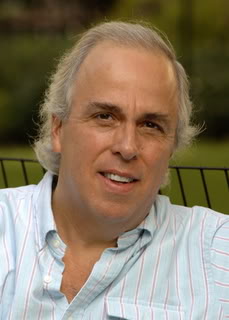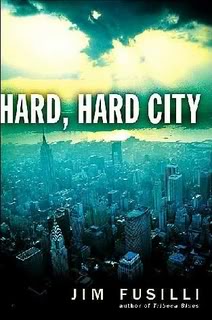INTERVIEW: Jim Fusilli & the Audible/ITW Project
By Therese Walsh | September 21, 2007 |
 Jim Fusilli is both an award-winning novelist and an accomplished author of short fiction. Recently his pet project, however, has been working as the editor of a story written by several authors with the International Thriller Writers association. It’s unique in that it’s a serial story that will be released through Audible.com one segment at a time. It’s a first, and it’s pretty exciting.
Jim Fusilli is both an award-winning novelist and an accomplished author of short fiction. Recently his pet project, however, has been working as the editor of a story written by several authors with the International Thriller Writers association. It’s unique in that it’s a serial story that will be released through Audible.com one segment at a time. It’s a first, and it’s pretty exciting.
I spoke with Jim recently about the project and about his work as an author. Enjoy!
Interview with Jim Fusilli
Q: For people who might not know anything at all about ITW, Audible and the Serial Thriller project, can you explain what it’s all about? How it began? What it’s become?
JF: The Chopin Manuscript is a thriller in which chapters were written by different authors, all members of the ITW. The contributors include Lee Child, David Corbett, Joseph Finder, John Gilstrap, James Grady, David Hewson, John Ramsey Miller, PJ Parrish, Ralph Pezzullo, SJ Rozan, Lisa Scottoline, Peter Spiegelman, Erica Spindler – and Jeffery Deaver, who wrote the first and last two chapters. I also wrote a chapter and edited the manuscript.
I’m not exactly sure how it began — MJ Rose asked me to edit and contribute, and I agreed. (I’m a big supporter of ITW’s projects for writers and kids.) But I’m sure they wanted to do something different from the “Thriller” anthology, which was a huge success. This is pretty different: There have been serial thrillers in the crime field, but nothing like this one, as far as I can tell.
Q: What sets it apart, specifically?
JF: Well, “Naked Came the Manatee” was a serial novel and had great writers like Elmore Leonard and Carl Hiassen and Edna Buchanan, but I think it was built on humor as much as crime. And “Naked Came the Phoenix” was clever – Lisa Scottoline, who’s in our novel, was in it. There have been others. But “The Chopin Manuscript” is a thriller – it’s an adrenalin rush. It has all the elements of the kind of contemporary novel that readers love.
Q: Tell me about the edited project. Who’s a part of it? What are you most exited about?
JF: I’m very excited about the finished project. It works a great thriller: it’s fast-paced and exciting – it builds and builds – with vivid characters and interesting locations in Europe and the U.S. It’s scary and chilling and witty, and the resolution is ingenious. I don’t mean to gush. Let me just say that I’m sure readers will get a thrill out of it.
I’m also excited by the level of enthusiasm and professionalism of the contributors. They gave up their time to work on a challenging project – to create a chapter of a novel that by design didn’t have an outline or plot points in advance – and do it on a tight deadline. Without exception, the authors made interesting choices – much more than interesting in many cases. They committed to the project and gave us the kind of creativity you find in their own work. It shows in the final product.
Q: How did the authors work together? Did they know where the story had to go, or did they “pantser” their way through it with great success? (Or a little bit of both?)
JF: There was no pre-planning, and as far as I know, no discussion among the authors. I sent everyone a running summary each time a chapter came in, and the full manuscript when it was an author’s turn to write. We worked quickly, which gave the book and urgency that serves the story.
Q: Were there ever any plot snags to work through, or was the editing fairly straightforward for you?
JF: No plot snags; I think we all saw the possibilities in what Jeff created. These authors are veterans – they know what it takes to advance a story with the reader in mind. For example, John Ramsay Miller and Peter Spiegelman had the sense that when it was their turn to write, their chapters needed to summarize the story. They didn’t discuss this with me; they just did what was best for the story. I edited to establish a consistency in grammar and style, but otherwise I pretty much let what the contributors submitted stand as it was. Why interfere with writers like these? I mean, who’s going to tell Lee Child or SJ Rozan how to be a better storyteller?
Q: What’s next for this project?
JF: It will be published as a downloadable audio by Audible. [Get it HERE.] The plan is to launch two or three chapters at a time – so you get a sense of an old-fashioned serial – beginning September 18 when the first three chapters will be available. By the way, Alfred Molina is the narrator. What a superb choice for the material.
Right now, we’re in the process of finding the right deal for print publication. Having spent a lot of time with the manuscript before Audible helped me shape it for the ear, I can tell you “The Chopin Manuscript” works great on the page too.
Q: If “The Chopin Manuscript” is a big success, do you think ITW and Audible could team up for a repeat? A sequel to the story, or something completely different?
JF: The characters in “The Chopin Manuscript,” particularly a father-daughter team Jeff developed and a young musician David Hewson came up with, could easily be revived for another book. But I don’t know what the ITW or Audible has planned. I imagine the readers’ reaction could determine what’s next. As a reader, I’d love to hear more from these characters. I imagine many readers will.
Q: Is there anything else you’d like for people to know about this project?
JF: I can’t say enough about the contributors. One of the reasons I took on the project was so I could learn how the top writers in the thriller and crime fields approach their craft. Without exception, they were reader focused and eager to build an exciting story. There was no ego involved, believe me. It was all about the story and the reader.
Here, a video of Lee Child, Jeffery Deaver, David Hewson, Joseph Finder, Jim Fusilli and P.J. Parrish discussing their involvement with the project:
[Note: Readers can listen to a free excerpt of The Chopin Manuscript HERE. Also, anyone purchasing TCM before September 25th receives a 20% discount.]
Q: You’re an author as well as an editor. I see you’ve published a “short” exclusively through Amazon.com called The Whistleblower’s Mistake. Can you tell us about the process of working through Amazon?
JF: Amazon was great. They make it easy to submit a story and they handle it in much the same way traditional print publishers do. They accepted what I sent and turnaround time was pretty quick. I seem to recall it was done in a couple of weeks. They copy-edited my piece and made it flow better. I’ve gotten some good feedback on the story for Amazon customers. I’m sure I’ll do it again at some point.
Q: What inspired The Whistleblower’s Mistake?
JF: I’m not a big believer in inspiration. After “Hard, Hard City” came out, it won some awards but didn’t reach as many readers as I’d hoped. So I decided to withdraw from writing novels so I could relearn the craft, and develop and demonstrate a bit of versatility: I wanted to show the industry I could do more than private-eye novels. One thing I decided to do was write short fiction and to publish so I could get reader feedback. I think I published 10 short stories in the past year or so – in different voices, in different eras, with a variety of protagonists, shifting points of view and so on. “The Whistleblower’s Mistake” allowed me to write a sort of a locked-door story and say something about how pharmaceuticals are marketed. I like the story, but I don’t view it as entirely successful. A nice try, maybe. But I think I’m way past that now.
 Q: Did anything other than the response to Hard, Hard City prompt you to take a break from writing to re-learn the craft?
Q: Did anything other than the response to Hard, Hard City prompt you to take a break from writing to re-learn the craft?
JF: I think I was caught up in the thrill of having my fiction published and I wasn’t really thinking enough about the reader and how to tell a story to reach a wider audience. I felt I needed to withdraw and learn how to communicate with the kind of readers who’d enjoy my writing – and how to develop my strengths as an author. I felt that the P.I. novel wasn’t the best way for me to tell my stories or to address the kind of issues I wanted to write about, at least in a way that readers would enjoy. I’m proud of the Terry Orr novels, especially A Well-Known Secret, which was the first novel to address 9/11 and its impact on the residents of New York City. But I needed a different way to communicate.
Q: What, if anything, did you learn during your time back at “the drawing board”? What do you think you’d moved away from? How, if you can pinpoint it, has your writing evolved since publishing The Whistleblower’s Mistake?
JF: I’d rather not answer this question because I don’t know yet if I can write the kind of books I’d like to write. I know I can do what I want in short fiction, and I think I’ve done it in the YA novel I have coming out next September – it’s called “Marley Z and the Blood-Stained Violin,” by the way. Maybe I should just say that I think I’ve come to understand that there may be a kind of book only I can write – and I should try to write it. It’s more than craft. It’s about understanding what you must write about and then finding a way to write it so readers enjoy the experience of spending time with your story and characters. I hope that makes sense…
Q: How are short stories a good learning tool when it comes to practicing craft? If a writer is interested in trying their hand at short story telling (and publishing), what steps would you recommend?
JF: Short fiction requires efficiency, brevity and concision. You have to be vivid in your writing when you’re doing short pieces, and disciplined. And short fiction requires us to learn what’s essential to share with the readers to help them understand what we’re trying to say. We have to cut all the fat and offer only what is absolutely necessary. These traits serve us well in anything we care to write. I always advise new writers to focus on the story and the reader, and not on publication. Make the story great and it’ll be published. Have a bad story published and you’ll regret it forever.
I hope this isn’t too self-important. I sort of think writers who aim only to publish are aiming too low—and we have too many bad books and too many copycat writers out there today.
Thanks so much, Jim Fusilli, for a great interview, and best of luck with the Serial Thriller project!










thanks for a very interesting interview. it sounds like he’s been part of an intriguing project!!